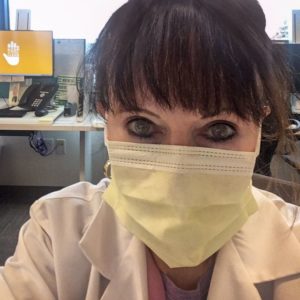Nursing in the Time of Covid
Long before the pandemic hit, the World Health Organization (WHO) had declared 2020 The Year of the Nurse, and now, in the midst of the COVID-19 pandemic, it seems especially fitting to acknowledge the work of nurses, for whose life hasn’t been touched by a nurse? That degree of commitment to patients happens not just during overwhelming newsworthy tragedies such as COVID-19, but in every hospital every minute of the day. It has always been a nurse who will be with us in those moments of crisis, a nurse who will guide us through the confusing maze of modern healthcare. It is invariably a nurse who will remember to ask your name as she struggles to save your life. It is a nurse who will call a code, comfort a family, and sit with a patient who has no one to visit. It is a nurse who will cradle a dying baby, soothe a mother’s worries, and tend to a child’s cuts and bruises. And at the end of your days, it is a nurse who will remember that you still matter. It is now and always a nurse who will stay by your side, and comfort you when you need it most.
In every hospital around the world, it has been a nurse who has worked feverishly to stem the tide of death and disaster that the virus has wrought. I am a nurse. I am one of the millions dedicated to providing healthcare no matter the circumstances. I have spent much of my career in an inner-city ER, and that experience provided me with the expertise and confidence to volunteer in many of the Third World’s grittiest war zones. I was a nurse secure in the knowledge that I’d seen it all and done it all, and there is a certain satisfaction, almost a smugness, that accompanies that kind of expertise.
And then Covid hit. And everything changed.
You’ve seen the photos—endless tangled extensions of medical tubing attached to patient monitors and medication pumps, snaking through doorways and stacked along busy hallways allowing exposure to the patient to be kept to a minimum. And when there is a need for direct contact, whether in a patient room, an ICU, an ER or a clinic, we are so thoroughly draped in PPE, heavy N95 masks, eye goggles or full plastic face shields, gloves, and gowns, we resemble space aliens.
Nurses can still perform the multitude of complex chores required to keep the sickest alive—calculate cardiac output, check labs to titrate meds, analyze the pumps, monitors, IVs and ventilators—or simply to keep close watch over our chronically ill patients through these darkest of times. We’ve somehow managed it all at a distance designed to minimize risk, and to keep our patients and ourselves safe. But we’ve accomplished our goals, as noble and vital as they are, at great cost.
The essence of nursing has been lost in this perplexing maze of Covid.
For nurses, who are so used to offering tangible comfort through a gentle touch, a knowing hug, a sympathetic gaze, or simply by our presence, the distance is not just physical, it is emotional as well. We are isolated in our PPE cocoons. There is no time to sit with patients or families, to teach and explain, to offer support when it is needed most. And even if there were time, can our patients hear us? My eyes are hidden behind my reading glasses and goggles, my voice is muffled by the N95 mask, and my touch is lost somewhere in the latex gloves I must wear. If I try to crinkle my eyes to indicate a smile, I can sometimes see the puzzlement on my patients’ faces, and I realize how confusing this must be for them as they are often alone and frightened.
In the bleakest of spots around the world, I’ve been able to hug a refugee, offer a hand, cradle a dying newborn, all through the gift of touch and closeness. It has been the same here at home in the ER or a clinic—I can hold a patient close, take a hand, stroke a fevered brow and whisper that everything will be OK. But in these days of Covid, all of that is lost. How do we convey our caring, our concern when we must keep a distance?
There is no doubt that Covid has taken a toll. Staff are quick to feel annoyance; patients are, too. Navigating this new normal will take time. But we will get there. I am certain of that. In the midst of misery, it is a nurse after all, who will lean in and gently whisper, You’ll be okay. Hold my hand. And though we may not be able to lean in quite as closely as we once did, and our hands may be encased in gloves, we will be leaning in one virtual step at a time. And though we may be tired and fearful, we know that our patients are as well. It is not the norm for nurses to worry first about themselves. Nurses’ tears aren’t for themselves, but rather for their patients and these times we are living in. Once this is over, we may sit and think more clearly about the effects of Covid on all of us, but these days, as another crisis looms, our eyes and our concerns, if not our hands, are on our patients. For we are nurses first.
Perhaps we haven’t lost our essence after all, perhaps it is that enforced isolation that creates that sense, but I know that as we continue to plot our course through this pandemic, my breath will surely catch in my throat as it has so many times already. I am one of them.
I am a nurse.
And, we will get through this.
Originally published in PandemicLens.com
Copyright © 2020 Roberta Gately